|
|
|
Sort Order |
|
|
|
Items / Page
|
|
|
|
|
|
|
| Srl | Item |
| 1 |
ID:
117740
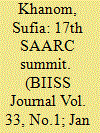

|
|
|
|
|
| Publication |
2012.
|
| Summary/Abstract |
This paper attempts to analyse the discussed issues and outcomes of the seventeenth SAARC Summit which took place in the Maldives from 10-11 November 2011 with a special reference to Bangladesh in the context of regional cooperation. Several significant and strategically important agreements were signed during this Summit with the intention to begin a new era of cooperation among the member countries. Therefore, the Summit declaration adopted several treaties like SAARC Agreement on Rapid Response to Natural Disasters, SAARC Seed Bank, SAARC Agreement on Multilateral Arrangement on Recognition of Conformity Assessment, and the SAARC Agreement on Implementation of Regional Standards. The agreements focused on enhancing and facilitating regional transit and connectivity, economic growth, ensuring energy security, combating terrorism and human trafficking and fight climate change. Though the Summit has come up with some promising mutual agreements, its success will depend on their proper and timely implementation. The lack of political will, problem of poor governance, weak economy and disparity, crisis of political leadership, ethnic, socio-cultural and religious divisions, challenges of non-state actors, transnational security challenges are considered to be the major hindrances to the success of regional integration. The South Asian region should develop its own short, medium, and long-term strategies for economic integration where each stage should be implemented effectively before moving on to the next in order to build a sound foundation for progress. The inclusion of China as 'dialogue partner' would help SAARC to make the tangible progress for regional cooperation in South Asia. The new focus on regional integrations is likely to create exciting opportunities for Bangladesh if it can exploit the synergies based on comparative advantages, investment in cross-border infrastructure projects, address challenges in governance, environmental and social developments.
|
|
|
|
|
|
|
|
|
|
|
|
|
|
|
|
| 2 |
ID:
128127
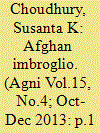

|
|
|
|
|
| Publication |
2013.
|
| Summary/Abstract |
The 11 September attacks in the United States caused NATO to invoke article 5 of the NATO charter for the first time in history. The article states that an attack on any member shall be considered to be attack on all. The invocation was confirmed on 4 October 2001 when NATO determined that the attacks were indeed eligible under the terms of North Atlantic Treaty Organisation, Eagle Assist and Operation Active Endeavour, a naval operation in the Mediterranean sea and is designed to prevent the movement of terrorists or weapons of mass destruction as well as to enhance the security of shipping the general which began on 4 October 2001.
|
|
|
|
|
|
|
|
|
|
|
|
|
|
|
|
| 3 |
ID:
091086
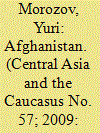

|
|
|
|
|
| Publication |
2009.
|
| Summary/Abstract |
Today cooperation between Russia and the U.S. in Central Asia, as part of the international efforts designed to neutralize the regional threats and challenges, is best described as spontaneous. There are, however, certain spheres in which their cooperation could be wider for the sake of regional stability. Afghanistan, which remains the main source of the destabilization threat, should become the main target of such cooperation.
|
|
|
|
|
|
|
|
|
|
|
|
|
|
|
|
| 4 |
ID:
087544
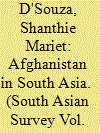

|
|
|
|
|
| Publication |
2009.
|
| Summary/Abstract |
Afghanistan seems to be sliding into chaos notwithstanding the initial euphoria that followed the toppling of the Taliban regime. The long-term stability of Afghanistan is mainly contingent upon its integration in a regional cooperative framework. The Afghanistan Compact adopted at the London Conference in January-February 2006 identified regional cooperation as a main plank of the international community's reconstruction strategy. However, not all stakeholders in the region share similar perceptions or interests in promoting regional cooperation. This article seeks to examine whether regional cooperation in South Asia could be an effective mechanism to bring in long-term stability in Afghanistan. Will regional cooperation augment Afghanistan's capacity to deliver basic needs to the Afghan people? Would its entry into the South Asian fold contribute to peace in that country?
|
|
|
|
|
|
|
|
|
|
|
|
|
|
|
|
| 5 |
ID:
073047
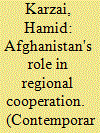

|
|
|
| 6 |
|
| 7 |
ID:
074881


|
|
|
|
|
| Publication |
2006.
|
| Summary/Abstract |
ASEAN has become the hub of the various networks of regional cooperation in East Asia. Neither China nor Japan can replace it. Japan should promote the further growth of these networks and find ways to involve the United States in regional affairs beyond security; in this way it can both engage and deter China.
|
|
|
|
|
|
|
|
|
|
|
|
|
|
|
|
| 8 |
ID:
053035
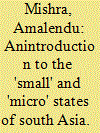

|
|
|
| 9 |
ID:
079137
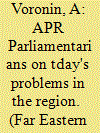

|
|
|
|
|
| Publication |
2007.
|
| Summary/Abstract |
The XV session of the Asia-Pacific Parliamentary Forum (APPF) was held in Moscow on January 22 - 25, 2007. The event was extraordinary not only by parliamentary but also by general Russian standards. For the first time, representatives from the highest legislative organs of 23 countries in the region gathered in Moscow for a comprehensive and thorough discussion of issues of common interest to the nations of the Asia-Pacific Region, and to draft a parliamentary program for joint efforts to combat contemporary challenges and threats
|
|
|
|
|
|
|
|
|
|
|
|
|
|
|
|
| 10 |
ID:
131895
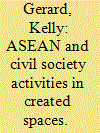

|
|
|
|
|
| Publication |
2014.
|
| Summary/Abstract |
The Association of Southeast Asian Nations (ASEAN) has recently made numerous commitments to engage civil society organizations (CSOs) in its governance practices. However, the opportunities created offer limited means for CSOs to contest policy as a result of strict controls over who can participate and the forms of participation permitted. Activists have consequently pursued their agendas outside of spaces sanctioned by ASEAN through 'created spaces,' such as conferences organized parallel to official summits. However, this form of political participation has limited potential to influence official processes because despite its independence, these activities are still structured in relation to ASEAN practices. The ineffectual nature of CSO advocacy despite ASEAN's people-orientated shift has been documented, however explanations for this trend remain limited. This article applies the modes of political participation framework that acknowledges the role of intergovernmental organizations in structuring spaces for civil society participation and, in doing so, shaping the contribution that CSOs can make. Through an examination of the regulations and practices that govern CSO participation in both ASEAN-sanctioned and independent spaces, it argues that spaces for CSO participation are structured to prevent CSOs from contesting policy, suggesting that ASEAN's shift to widen participation is directed towards legitimating its reform agenda. Hence, ASEAN's claim of becoming 'people oriented' must be considered in recognition of the limiting effect its engagement practices have on CSOs' ability to advance alternative agendas.
|
|
|
|
|
|
|
|
|
|
|
|
|
|
|
|
| 11 |
ID:
018783


|
|
|
|
|
| Publication |
2000.
|
| Description |
421-452
|
|
|
|
|
|
|
|
|
|
|
|
|
|
|
|
| 12 |
ID:
093367
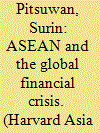

|
|
|
| 13 |
ID:
082844
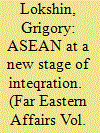

|
|
|
|
|
| Publication |
2008.
|
| Summary/Abstract |
The year 2007 was a special one for the ten nations of Southeast Asia, where the 40th anniversary of their international organization, ASEAN, one of the most successful projects for regional integration, was widely celebrated. The main event was the signing by all ASEAN leaders of the organization's long-awaited Charter, the first such document in its history, at ASEAN's XIII Summit, held in Singapore from 18 through 22 November 2007. ... At the moment of its inception back in 1967, ASEAN encompassed just five nations: Indonesia, Malaysia, Singapore, Thailand, and the Philippines
|
|
|
|
|
|
|
|
|
|
|
|
|
|
|
|
| 14 |
ID:
080117
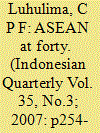

|
|
|
| 15 |
ID:
061010
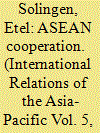

|
|
|
| 16 |
ID:
059836
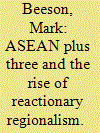

|
|
|
| 17 |
ID:
083822
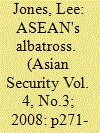

|
|
|
|
|
| Publication |
2008.
|
| Summary/Abstract |
Following the abortive "Saffron Revolution" of autumn 2007, Burma's ASEAN partners were subject to the timeworn criticism that the grouping persistently fails to act against its pariah member due to its near-religious adherence to the norm of non-interference. Conversely, this paper argues that ASEAN's policy towards Burma has never been one of strict non-interference, but has always been premised on the claim that ASEAN can encourage political change there. Moreover, the non-interference principle has come under increasing pressure since the Asian financial crisis. The article tracks the evolution of ASEAN's policy, from the adoption of constructive engagement in 1988, through the gradual frustration of ASEAN's designs, to its present position of critical disengagement, arguing ASEAN's failure to take a stronger line has less to do with any binding "norms" than with the interests of the region's predominantly illiberal elites and the grouping's increasing difficulties in achieving meaningful consensus
|
|
|
|
|
|
|
|
|
|
|
|
|
|
|
|
| 18 |
ID:
132400
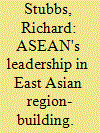

|
|
|
|
|
| Publication |
2014.
|
| Summary/Abstract |
Despite none of its members being a major economic or military power, the Association of Southeast Asian Nations (ASEAN) has played a leading role in building East Asia's regional institutions. In exploring this apparent puzzle, the analysis reviews the literature on state leadership at the regional and international level, asks why the region's major powers ceded leadership on the question of regional institution building to ASEAN, and assesses the consequences for East Asia's regional architecture of ASEAN's leadership role in institution-building. The conclusion is that leadership at the state level entails a state, or a group of states, proposing, executing and getting others to agree on a course of action to deal with a specific problem or challenge. The analysis also underscores the point that, while ASEAN has been the leader in East Asian institution-building, the Association and its members should not automatically be expected to play a leadership role on all issues preoccupying the region.
|
|
|
|
|
|
|
|
|
|
|
|
|
|
|
|
| 19 |
ID:
053504
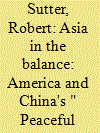

|
|
|
| 20 |
ID:
086795
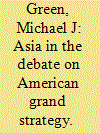

|
|
|
|
|
| Publication |
2009.
|
| Summary/Abstract |
The United States faces multiple national security challenges, but in the longer sweep of history it is our response to the rise of Chinese power that may have the greatest significance. Over the previous two centuries the Anglo-American-led neoliberal order faced three rising powers. Great Britain managed the rise of American power at the end of the nineteenth century, through a deft strategy of accommodation and co-option. However, the United States and Britain failed to prevent the rise of Japanese and German power from leading to a calamitous global conflict. In those cases both deterrence and accommodation failed. We thus face the prospect of rising Chinese power with a one-for-three record, and the one case of success was one in which the rising power shared the values of the preeminent power.
|
|
|
|
|
|
|
|
|
|
|
|
|
|
|
|
|
|
|
|
|